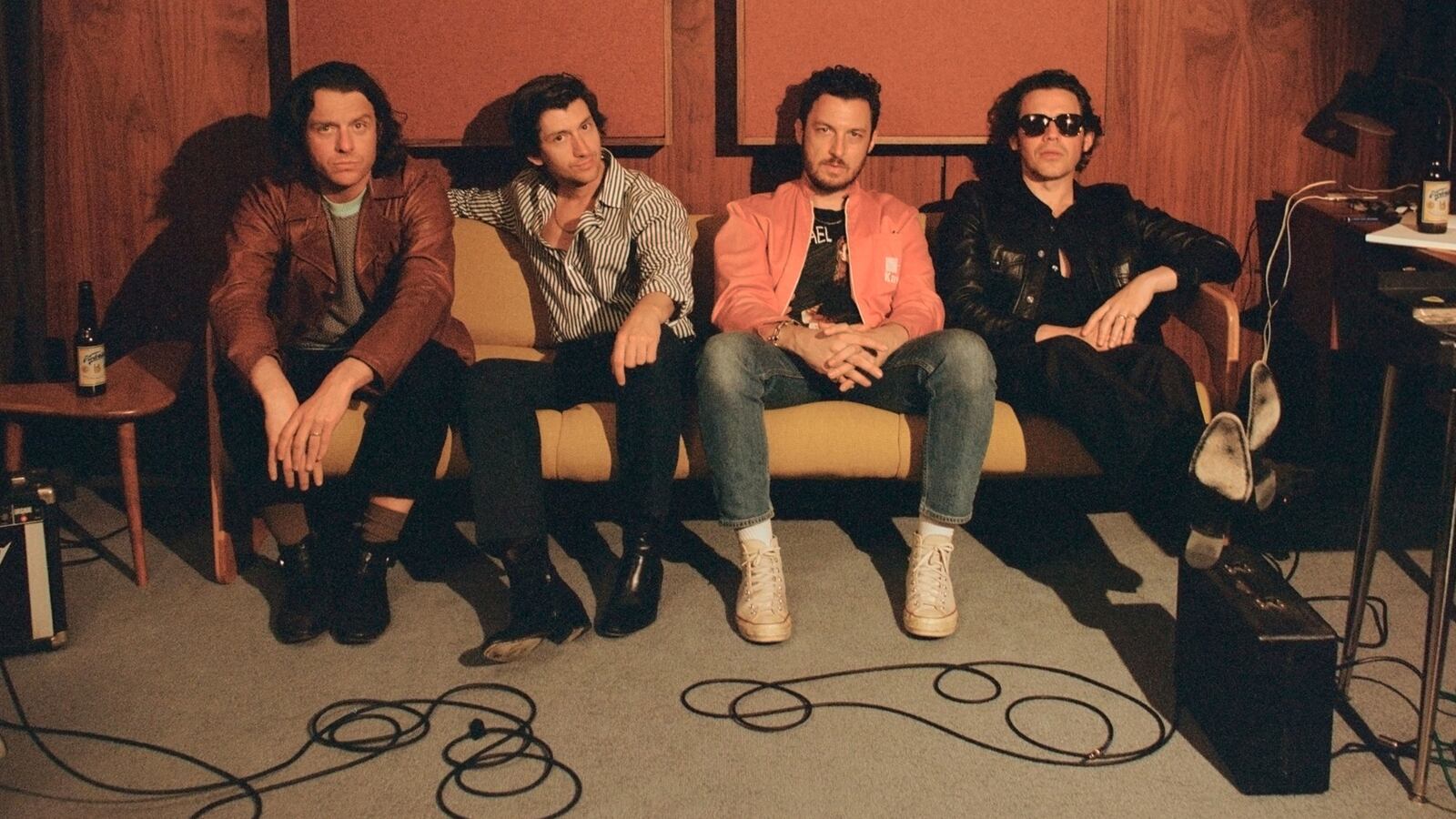British indie rockers Arctic Monkeys have heard what you think of them by now. In response to fans’ complaints about the band’s evolving sound—most notably on their 2018 psychedelic adventure Tranquility Base Hotel & Casino—lead singer Alex Turner recently had this to say:
“Maybe it’s wishful thinking, but I’m like, Can’t you see that [throughline]?” Turner told Alternative Press. “I feel like we’ve got to move on… it’s been almost 10 years since [AM]. I don’t think there’s a way to keep doing that. And I think [we] sound like the same band that we did in the beginning.”
For the nearly two decades that Arctic Monkeys have been around, Turner and his bandmates Matt Helders, Jamie Cook, and Nick O’Malley have embraced new subgenres and influences in some capacity on all of their albums. Yet a subset of their fanbase has seemingly not recovered from the sonic whiplash of TBHC, the polarizing follow-up to their 2013 blockbuster AM, which catapulted the already popular band into internet icons, thanks to singles like “R U Mine?”, “Do I Wanna Know?”, and “Why’d You Only Call Me When You’re High?”
But as Turner suggests, evolution has always been a part of the band’s M.O. And their commitment to soft rock and exciting embrace of funk on their seventh album, The Car, out today, sends a clear message to stubborn traditionalists: You can either come along for the ride or get left behind.
This idea of moving forward with the band could very well be the inspiration behind the title The Car—as could a million other things, given Turner’s cryptic songwriting that’s become its own meme at this point. On this latest album, the 36-year-old frontman takes listeners on another puzzling journey, offering more unexplained metaphors, disorienting settings, and ellipses galore. By now, longtime fans have learned that trying to decipher most of Turner’s lyrics is a thankless task. Even so, the musician always provides enough striking images, emotions, and, of course, melodies for fans to latch onto—and this latest endeavor is no different.
On The Car, Turner and the rest of the band seem more preoccupied with establishing a nostalgic, often melancholic mood, with the lead singer bidding a farewell on multiple songs. The album’s lush first single, “There’d Better Be A Mirrorball,” remains one of the most evocative tracks out of all 10 thanks to its surprising but welcome use of strings during the final chorus. It’s exciting, then, that this elegant flourish sets the stage for the rest of the album.
In place of the band’s satisfying guitar riffs and Helders’ electric drumming, listeners are treated to a slow build of conga drums, wah-wah pedal, and an orchestra. The album also finds the band blatantly dipping into more Black influences than ever before; songs like “Hello You” and “I Ain’t Quite Where I Think I Am” invoke the flavor of Curtis Mayfield and Sly and The Family Stone. (The former track even feels like it could score the opening credits of a ’70s Blaxploitation movie). Elsewhere, “Mr. Schwartz,” “Perfect Sense,” and “Big Ideas” lean into the more mellow tones of yacht rock.
In a recent radio interview, Turner briefly discussed the idea of certain sounds having more interesting things to say than lyrics. In that way, The Car seems more focused on adding texture over the course of a song and incorporating new instruments—one of them being Turner’s heavily used falsetto. That said, folks anticipating the singable, pop-rock-adjacent melodies of My Favorite Worse Nightmare or AM will probably be left disappointed.

Track 3, “Sculptures of Anything Goes,” is a prime example of the album’s innovative arrangements. It begins simply, with a pulsating synthesizer that could soundtrack a horror movie, before building to a loud, menacing, gorgeous crescendo. A feeling of paranoia percolates throughout; Turner mentions “retired spies” and seemingly alludes to the criticism of their last album. “Guess I’m talking to you now,” he rambles. “Puncturing your bubble of relatability with your horrible new sound.”
The Car’s title track delivers the same sort of melodrama. Ironically—and rather humorously—it has some of the most mundane lyrics on the album. Alongside a cinematic orchestra and a pristine guitar, Turner straightforwardly describes the annoying demands of going on a holiday—namely, being asked to “fetch something from the car.” One can only imagine how unexciting vacations are when it’s your job to travel the globe, so while you might assume there’s more profoundness to the lyrics, it makes for a cheeky, antisocial anthem at its most basic interpretation.
“The Car” encapsulates Turner’s tone throughout most of the album. There’s a level of indifference and even sardonicism to the way he references his past and current romantic experiences. Most listeners have gotten used to the serial monogamist wearing his heart on his sleeve and singing about his partners like deities. And yet, he resists the urge to sound like a total simp throughout most of these songs, a hallmark that I admittedly missed.
In sum, The Car is another testament to the band’s commitment to growth and shocking consistency as a 20-year-old rock act. The quartet, all in their mid-to-late thirties now, have no interest in recreating the angsty tunes of their Sheffield adolescence for the comfort of others; they understand the value of maturity, which often means expanding your worldview. Likewise, it’s time the world accepts a more soulful, dad-rock version of Arctic Monkeys.







